| Listing 1 - 8 of 8 |
Sort by
|
Book
ISBN: 1462380050 1451990340 1283515474 1451910819 9786613827920 Year: 2007 Publisher: Washington, D.C. : International Monetary Fund,
Abstract | Keywords | Export | Availability | Bookmark
 Loading...
Loading...Choose an application
- Reference Manager
- EndNote
- RefWorks (Direct export to RefWorks)
Recent studies conclude that the ongoing global financial integration may have had little or no value in advancing economic growth, especially in poor countries. Capital is often found to flow "uphill" from poor to rich countries. And, when it does flow into the less developed economies, it is negatively correlated with growth, calling into question the desirability of foreign capital. In this paper we report that Europe-including the new member states of the European Union-provides a counterexample to these global anomalies. With increasing financial integration, capital in Europe has traveled "downhill" from rich to poor countries, and has done so with gathering strength. These inflows have been associated with significant acceleration of income convergence.
Balance of payments -- European Union countries -- Econometric models. --- Balance of payments -- European Union countries. --- Convergence (Economics) -- European Union countries -- Econometric models. --- Convergence (Economics) -- European Union countries. --- Exports and Imports --- Finance: General --- Macroeconomics --- Current Account Adjustment --- Short-term Capital Movements --- General Financial Markets: General (includes Measurement and Data) --- Personal Income, Wealth, and Their Distributions --- International economics --- Finance --- Financial integration --- Current account deficits --- Personal income --- Current account --- Current account balance --- Balance of payments --- International finance --- Income --- United States --- International finance.
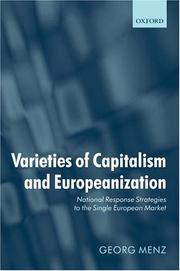
ISBN: 0199273863 9786610755219 019156415X 1280755210 1423770994 9780199273867 0199551030 9780199551033 Year: 2005 Publisher: Oxford: Oxford university press,
Abstract | Keywords | Export | Availability | Bookmark
 Loading...
Loading...Choose an application
- Reference Manager
- EndNote
- RefWorks (Direct export to RefWorks)
Europeanization has often been conceived as a top-down process, necessitating implementation and adjustment at the national level. However, Europeanization can also be conditioned by bottom-up national initiatives. While recent endeavors in comparative political economy have emphasized the resilience of coordinated market economies, few detailed empirical studies have examined to date exactly how different European systems of political-economic governance cope with and respond to an European impetus for liberalization. This original study of the impact of the EU-induced liberalization of service provision on member states argues that innovative national re-regulatory strategies may be implemented in response to Europeanization. In permitting any company registered in an EU member state to provide services throughout Europe, new possibilities were created for the transnational posting of workers from low-wage to high-wage countries. However, high-wage countries could re-regulate the wage levels applicable to such employees.; The exact nature of such response strategy is coloured by the respective institutional power that labour market interest associations like trade unions and employer associations command. Therefore, different institutionalised varieties of capitalism generate distinct re-regulations of the Single European Market. Drawing on detailed case studies of ten European countries, this volume bridges the gap between the rapidly unfolding scholarly debate on Europeanization and varieties of capitalism. It argues that both strongly neocorporatist systems of political-economic governance and statist systems are capable of creating swift, comprehensive and thorough national re-regulations. This applies to Austria and France, but also Sweden, Denmark, Norway, Finland, Belgium, and Luxembourg. By contrast, countries with less strongly embedded neocorporatist structures, in which due to organizational deficiencies trade unions face difficulties blocking employer demands, create liberal response strategies, permitting a stratification of wage levels. Hence, both Germany and the Netherlands implemented liberal business-friendly re-regulations.; The volume makes the case for important amendments to existing accounts of Europeanization and varieties of capitalism. Scholars of Europeanization need to incorporate bottom-up re-regulation into their conceptual framework, particularly in response to 'negative integration'. Recent strides in comparative political economy have placed great emphasis on continued divergence, yet this study suggests that even within the presumably unified group of 'non-liberal' coordinated market economies important institutional differences produce very distinct responses in the face of European liberalization.
Convergence (Economics) --- Capitalism --- Industrial policy --- Rapprochement (Economie) --- Capitalisme --- Politique industrielle --- #SBIB:327.7H231 --- Europese Unie: sociaal-economisch beleid, landbouw-, milieu-, cultuur- en communicatiebeleid --- E-books --- Industrial Management --- Economic History --- Management --- Business & Economics --- Market economy --- Economics --- Profit --- Capital --- Economic convergence --- Convergence (Economics) - European Union countries --- Industrial policy - European Union countries.
Book
ISBN: 9782296025677 2296025676 Year: 2007 Publisher: Paris: L'Harmattan,
Abstract | Keywords | Export | Availability | Bookmark
 Loading...
Loading...Choose an application
- Reference Manager
- EndNote
- RefWorks (Direct export to RefWorks)
Convergence (Economics) --- Regionalism --- European Union countries --- Economic policy --- Politics and government --- EEC / European Union - EU -Europese Unie - Union Européenne - UE --- 334.151.4 --- EG : regionaal beleid. Europees Fonds voor Regionale Ontwikkeling. --- Economic convergence --- EG : regionaal beleid. Europees Fonds voor Regionale Ontwikkeling --- Economic policy. --- Politics and government. --- Economics --- Développement économique --- Convergence (Economics) - European Union countries --- Regionalism - European Union countries --- European Union countries - Economic policy --- European Union countries - Politics and government --- Etat --- Region --- Ue
Book
ISBN: 9291660574 9789291660575 Year: 1998 Publisher: Frankfurt am Main: European monetary institute,
Abstract | Keywords | Export | Availability | Bookmark
 Loading...
Loading...Choose an application
- Reference Manager
- EndNote
- RefWorks (Direct export to RefWorks)
Money. Monetary policy --- International finance --- European Union --- Europese Unie --- Finances --- Geld --- Geldwezen --- Monnaies --- Union européenne --- Convergence (Economics) --- Finance --- Statistics --- 336.74 --- 339.7 --- EEC / European Union - EU -Europese Unie - Union Européenne - UE --- 334.151.20 --- 331.31 --- T04 ECU / EMS / EMU / EMI / Euro / ESCB --- Europese instellingen --- economische toestand --- geld --- geldwezen --- monetaire politiek --- Geld. Monetaire politiek --- Internationale financiën --- Economische en monetaire unie van de Europese Gemeenschappen: algemeenheden. --- Economisch beleid. --- internationale financiën --- -Finance --- -Convergence (Economics) --- -European currency unit --- European currency unit --- -Monetary unions --- -Currency question --- -330.94 --- Fiat money --- Free coinage --- Monetary question --- Scrip --- Currency crises --- Finance, Public --- Legal tender --- Money --- Common currencies --- Currency areas --- Currency unions --- Optimum currency areas --- Currency question --- ECU (Unit of account) --- Economic convergence --- Economics --- Funding --- Funds --- Electronic information resources --- Economisch beleid --- Economische en monetaire unie van de Europese Gemeenschappen: algemeenheden --- Convergence (Economics) - European Union countries --- Finance - European Union countries - Statistics
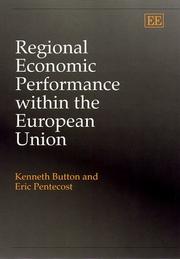
ISBN: 185898064X 9781858980645 Year: 1999 Publisher: Cheltenham: Elgar,
Abstract | Keywords | Export | Availability | Bookmark
 Loading...
Loading...Choose an application
- Reference Manager
- EndNote
- RefWorks (Direct export to RefWorks)
Economic conditions. Economic development
---
International economic relations
---
Economic geography
---
European Union
---
Regional planning
---
Convergence (Economics)
---
European Union countries
---
Economic conditions
---
Regional disparities
---
Economic policy
---
Economic integration
---
711.2
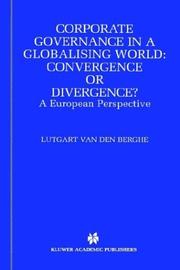
ISBN: 9781402071584 1402071582 9780306475382 9786610200252 1280200251 0306475383 Year: 2002 Publisher: Boston: Kluwer,
Abstract | Keywords | Export | Availability | Bookmark
 Loading...
Loading...Choose an application
- Reference Manager
- EndNote
- RefWorks (Direct export to RefWorks)
Corporate Governance In A Globalising World: Convergence Or Divergence? presents a broad and multi-disciplinary debate on corporate governance systems by integrating academic viewpoints, statistical evidence, as well as field surveys. Based on a large number of publications and studies, the opinions of researchers are grouped into three categories: those that believe in a convergence into the direction of the market-oriented model (with the Anglo-American model as the reference base), those that opt for another type of convergence, namely in the direction of a hybrid corporate governance model (based on cross-reference between different leading governance models), and those that do not believe in global convergence but adhere to diversity of governance models.
Corporate governance --- Boards of directors --- Convergence (Economics) --- Gouvernement d'entreprise --- Rapprochement (Economie) --- Management --- Business & Economics --- Industrial Management --- Management Theory --- 658.315 --- 658.114 --- #ECO:03.04:industrie en onderneming corporate governance --- Relations between management and workforce within the firm --- Forms of enterprise in general. Private businesses --- 650 --- 658.114 Forms of enterprise in general. Private businesses --- 658.315 Relations between management and workforce within the firm --- Theorieën en grondbeginselen. Management. --- Governance, Corporate --- Industrial management --- Directors of corporations --- Economic convergence --- Economics --- Boards of supervision (Corporation law) --- Associations, institutions, etc. --- Theorieën en grondbeginselen. Management --- Theorieën en grondbeginselen. Management --- Management. --- Administration --- Industrial relations --- Organization --- Corporate governance - European Union countries --- Boards of directors - European Union countries --- Convergence (Economics) - European Union countries
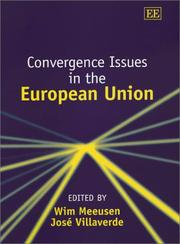
ISBN: 1840646667 9781840646665 Year: 2002 Publisher: Cheltenham, UK: Elgar,
Abstract | Keywords | Export | Availability | Bookmark
 Loading...
Loading...Choose an application
- Reference Manager
- EndNote
- RefWorks (Direct export to RefWorks)
International economic relations --- European Union --- Finance --- Labor market --- Finances --- Marché du travail --- European Union countries --- Pays de l'Union européenne --- Economic integration --- Economic conditions --- Regional disparities --- Economic policy --- Social policy --- Intégration économique --- Conditions économiques --- Disparités régionales --- Politique économique --- Politique sociale --- Convergence (Economics) --- Regional disparities. --- #SBIB:024.IO --- #SBIB:327.7H231 --- #SBIB:33H13 --- #SBIB:35H435 --- 334.151.20 --- 334.151.21 --- 334.151.3 --- 334.151.50 --- EEC / European Union - EU -Europese Unie - Union Européenne - UE --- arbeidsmarkt --- economische integratie, internationaal --- economische politiek --- EMU --- Europese Unie --- fiscaliteit --- monetaire politiek --- 337.142 --- -Finance --- -Labor market --- -Convergence (Economics) --- -Employees --- Market, Labor --- Supply and demand for labor --- Markets --- Funding --- Funds --- Economics --- Currency question --- Economic convergence --- Europese Unie: sociaal-economisch beleid, landbouw-, milieu-, cultuur- en communicatiebeleid --- Economische politiek --- Beleidssectoren: economisch en werkgelegenheidsbeleid --- Economische en monetaire unie van de Europese Gemeenschappen: algemeenheden. --- Europese centrale bank. ESCB. Centrale banken. --- EG : begrotings- en belastingpolitiek. --- Sociaal beleid : algemeenheden. --- Supply and demand --- -European Union countries --- -EU countries --- Euroland --- Europe --- -Regional disparities --- Europese Unie: economische integratie --- Europese Unie: economische integratie. --- -Europese Unie: sociaal-economisch beleid, landbouw-, milieu-, cultuur- en communicatiebeleid --- -Economic conditions --- Marché du travail --- Pays de l'Union européenne --- Intégration économique --- Conditions économiques --- Disparités régionales --- Politique économique --- Employees --- Economische en monetaire unie van de Europese Gemeenschappen: algemeenheden --- Europese centrale bank. ESCB. Centrale banken --- EG : begrotings- en belastingpolitiek --- Sociaal beleid : algemeenheden --- Economic integration. --- Economic policy. --- Social policy. --- Convergence (Economics) - European Union countries. --- Finance - European Union countries. --- Labor market - European Union countries - Regional disparities.
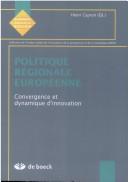
ISBN: 280414996X 9782804149963 Year: 2006 Volume: *17 Publisher: Bruxelles: De Boeck,
Abstract | Keywords | Export | Availability | Bookmark
 Loading...
Loading...Choose an application
- Reference Manager
- EndNote
- RefWorks (Direct export to RefWorks)
Economic policy and planning (general) --- Economie régionale et locale --- Europese Unie ; economie --- Regionale en lokale economie --- Union européenne ; économie --- Economic assistance, Domestic --- Regional economics --- Regional planning --- Aide au développement économique régional --- Economie régionale --- Aménagement du territoire --- Aide au développement économique régional--Pays de l'Union européenne--Congrès --- Convergence (économie politique)--Pays de l'Union européenne--Congrès --- Convergence (Economics) --- Technological innovations --- Diffusion of innovations --- Pays de l'Union européenne--Politique économique--Congrès --- Innovations--Diffusion--Pays de l'Union européenne--Congrès --- European Union countries --- Economic integration --- Economic conditions --- Regional disparities --- BPB0606 --- 342.26 EU --- EEC / European Union - EU -Europese Unie - Union Européenne - UE --- 334.151.4 --- 330.191.4 --- Regionalisatie--EU --- EG : regionaal beleid. Europees Fonds voor Regionale Ontwikkeling. --- regionale economie - gewestelijke economie - economische decentralisatie --- Convergence (économie politique) --- Innovations technologiques --- Politique publique --- Aide au développement économique régional --- Economie régionale --- Aménagement du territoire --- Breakthroughs, Technological --- Innovations, Industrial --- Innovations, Technological --- Technical innovations --- Technological breakthroughs --- Technological change --- Creative ability in technology --- Inventions --- Domestication of technology --- Innovation relay centers --- Research, Industrial --- Technology transfer --- Innovations, Diffusion of --- Acculturation --- Communication --- Culture diffusion --- Economic convergence --- Economics --- EG : regionaal beleid. Europees Fonds voor Regionale Ontwikkeling --- EU countries --- Euroland --- Europe --- Innovation --- Convergence (Economics) - European Union countries - Congresses --- Technological innovations - European Union countries - Congresses --- Diffusion of innovations - European Union countries - Congresses --- European Union countries - Economic integration - Congresses --- European Union countries - Economic conditions - Regional disparities - Congresses
| Listing 1 - 8 of 8 |
Sort by
|

 Search
Search Feedback
Feedback About UniCat
About UniCat  Help
Help News
News